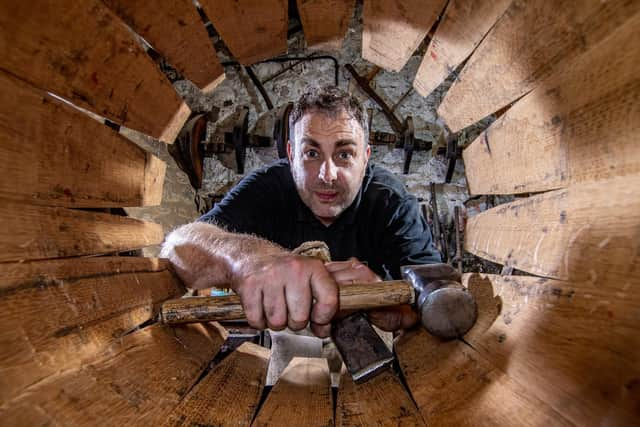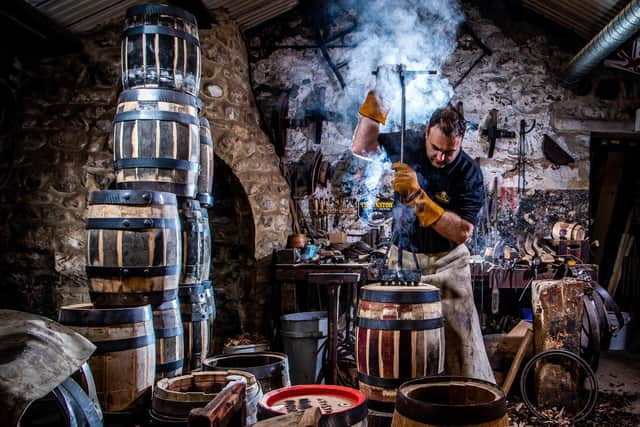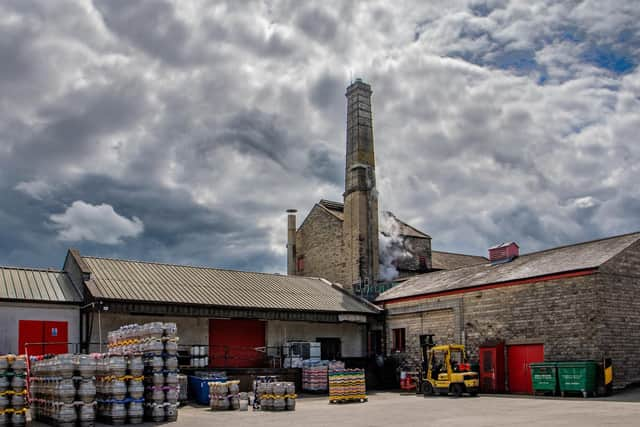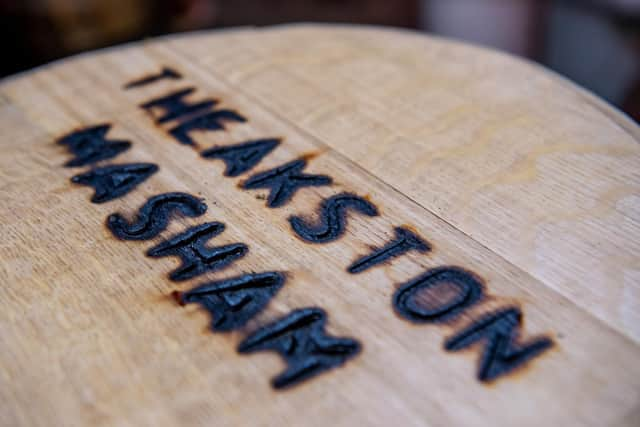Meet Theakston's master cooper - the man helping keep an ancient craft alive
“I always liked the idea of working with wood and oak especially,” he says. “First of all I wanted to make furniture and I studied at what was Jacob Kramer College in Leeds with this in mind, but afterwards this job came up and I applied for it and ended up making casks.”
That was 25 years ago and he’s been doing it ever since. The job in question was apprentice cooper at Theakston’s Brewery in North Yorkshire, and now he’s a master cooper having trained an apprentice himself.
Advertisement
Hide AdAdvertisement
Hide AdCoopering is a craft soaked in history. The word ‘‘cooper’’ itself is derived from the Latin ‘‘cupa’’, meaning tun or barrel, and the oldest known depiction of a cask was found in an Egyptian pyramid and dates way back to 2960 BC.


“At one point coopering was very popular and there were different classes of coopering,” says Jonathan. “We’re classed as wet coopers, but you also had dry coopers who made things like flour casks and gunpowder casks, and you had fish coopers working on the dockside making herrings casks. Everything was carried in casks at one point and you can tell how popular it was by the fact there are so many people with the surname ‘Cooper’, which relates to the trade.”
Today, the craft survives through knowledge being passed down by the few remaining masters, people like Jonathan. An apprentice becomes a journeyman cooper and only once they have trained an apprentice can they can call themselves a master cooper.
The Masham-based brewery is one of the few in the country committed to making and repairing traditional oak casks and having its own cooper and apprentice.
Advertisement
Hide AdAdvertisement
Hide AdTheakston’s still makes traditional oak casks to store and transport its famous ales as it has done ever since the family-run company was started back in 1827.


Jonathan enjoys working with oak because it’s tactile and at the same time strong and reliable. “Wood is the best material to work with. It’s a natural material, every piece of timber you pick up is different and that makes it interesting, and sometimes a bit of a challenge.”
Coopering isn’t a skill that can be mastered quickly and it takes an apprentice up to four years to become adept at the job. “You start off with straight pieces of timber and join them up and make them into a beer-type cask. But you can’t pick it up from a textbook, it requires hands-on experience because it’s all about hand-eye coordination to get the angles on the staves. It can’t be written down, you have to pass the skills down.”
For all his experience, and despite the fact he’s a ‘‘master’’ in his trade, he says that he’s still learning. “Every piece of timber is unique, the grain runs out in a different direction so you’re constantly learning. It’s not like working with plastic where it’s uniform all the way through.”
Advertisement
Hide AdAdvertisement
Hide AdThere’s a desire to continue using wooden casks and preserve what is an ancient and skilled art. “We’re a small family brewery and when all the larger breweries were going on to metal casks, Theakston’s saw an opportunity to start buying up wooden casks because they were cheap and we’re now one of the last ones that use them. Simon Theakston is in charge now and he’s committed to keeping the wooden cask trade alive.”


If you asked most ale drinkers they would probably approve of their beer being served from wooden casks. They do, however, require a bit more maintenance which is why most breweries moved on to metal or plastic casks.
That said, wooden casks can last a long time. “If a stave breaks it can be brought back into the workshop and replaced so a cask can last for about 40 years.”
Given that plastic casks can split and end up being thrown away and metal ones can dent more easily, it shows that wooden ones can be a good, sustainable option. Though the secret of any good cask is, says Jonathan, quite simple - “one that doesn’t leak”.
Advertisement
Hide AdAdvertisement
Hide AdHe still makes oak casks each year for licensees who want their ales served that way, though most of his work these days revolves around repairing existing casks rather than creating new ones. At the moment he’s working on ex-whiskey (54 gallon) casks and knocking these down into either nine gallon firkins, or four-and-a-half gallon pin casks.


His job has changed little over the years and the only significant difference, he says, is the size of the containers. “When I first started we were still taking 36 gallon barrels out, but as more micro-breweries have come along and people want more choice and bars are putting a wider choice of beers on, they’re wanting smaller containers to keep the beer fresher, so our main size now is a nine gallon firkin.”
The casks are used to store the beer when it’s moved from the brewery to a pub or wherever it’s going. So it isn’t like wine, which ages in oak barrels, and the beer is only in the barrels for days and weeks, rather than months or years.
“With a new cask you might have a little bit of tannin coming out in the first instance, but we try and keep it as neutral as possible so that we get a consistent flavour with the beer. That’s what you’re after.”
Advertisement
Hide AdAdvertisement
Hide AdAs well as making beer casks, Jonathan demonstrates his prowess in the brewery’s cooperage – which is one of the highlights of Theakston’s visitor centre tour – and at fairs, festivals and shows all over the country.
He uses the same methods and tools to create casks that coopers have done for centuries and watching in action is always a big draw. “People don’t realise how few coopers there are in the country and it’s something we try to make them aware of and at the same time show them the skill of the trade,” he says.
This was all put on hold during the lockdown and, with his apprentice furloughed, he’s been concentrating on sorting out the various casks that have come back from the pubs and cleaning them using hot water and steam.
“We can’t just leave the casks lying dormant for a long period of time. If you get any mold from beer being left inside you have to un-head the casks and scrub them out.”
Advertisement
Hide AdAdvertisement
Hide AdToday, Theakston’s and Samuel Smith’s are believed to be the only breweries that still train apprentice coopers in this country. It’s something of a badge of honour for the county. “All the coopers are up in Yorkshire these days,” says Jonathan.
And a quarter of a century after he started at Theakston’s he still enjoys his work. “You can’t beat making something from scratch, plus you’re also giving pleasure to other people who enjoy the Old Peculier that comes out of the casks.”
There’s pride, too, in the sense of history encased in this most ancient of trades. “If it died out then it would be lost forever so we need to keep it going. It’s a craft and it’s part of our heritage. Coopering goes right back to Egyptian times and we’re just a continuation of that long line.”
Editor’s note: first and foremost - and rarely have I written down these words with more sincerity - I hope this finds you well.
Advertisement
Hide AdAdvertisement
Hide AdAlmost certainly you are here because you value the quality and the integrity of the journalism produced by The Yorkshire Post’s journalists - almost all of which live alongside you in Yorkshire, spending the wages they earn with Yorkshire businesses - who last year took this title to the industry watchdog’s Most Trusted Newspaper in Britain accolade.
And that is why I must make an urgent request of you: as advertising revenue declines, your support becomes evermore crucial to the maintenance of the journalistic standards expected of The Yorkshire Post. If you can, safely, please buy a paper or take up a subscription. We want to continue to make you proud of Yorkshire’s National Newspaper but we are going to need your help.
Postal subscription copies can be ordered by calling 0330 4030066 or by emailing [email protected]. Vouchers, to be exchanged at retail sales outlets - our newsagents need you, too - can be subscribed to by contacting subscriptions on 0330 1235950 or by visiting www.localsubsplus.co.uk where you should select The Yorkshire Post from the list of titles available.
If you want to help right now, download our tablet app from the App / Play Stores. Every contribution you make helps to provide this county with the best regional journalism in the country.
Sincerely. Thank you.
James Mitchinson
Editor
Comment Guidelines
National World encourages reader discussion on our stories. User feedback, insights and back-and-forth exchanges add a rich layer of context to reporting. Please review our Community Guidelines before commenting.